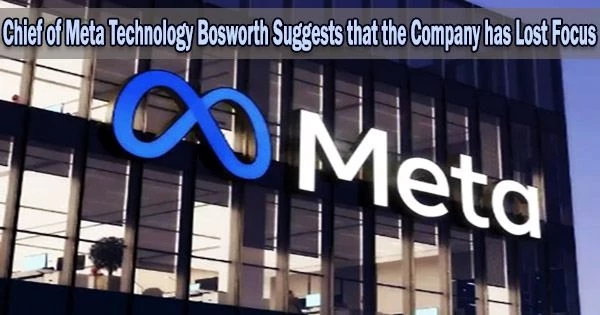One of Facebook’s first workers, Meta technology head Andrew “Boz” Bosworth, wrote on his own blog over the weekend that the firm was more focused in its early days and that growing large has its challenges.
In a blog post titled “Focus,” Bosworth compared the early years, when he didn’t get much sleep, ate poorly, and had “no hobbies,” with the mature company, which has many people contributing ideas for product features and sufficient funding to cover less crucial expenses.
“Resources and time were so tight that you could feel the weight of all the things you weren’t working on,” wrote Bosworth, who started the post by saying he was “something like” the 10th engineer at the company. “You had real conviction that the thing you were doing was the most important thing.”
Bosworth’s tweet was published just a few days before Meta is scheduled to issue its fourth-quarter earnings report on Wednesday after the bell. Analysts anticipate that the parent company of Facebook will post its third straight quarter of declining quarterly sales. Meta lost two-thirds of its value last year.
Bosworth was promoted to the top tech post in 2021, replacing Mike Schroepfer, who had been with the company since 2008. Bosworth is overseeing Meta’s ambitious and costly endeavor to develop the digital world of the metaverse, which CEO Mark Zuckerberg has said will define the company’s future.
While he acknowledged that he doesn’t miss startup life, “I do miss the profound sense of focus,” Bosworth wrote.
With limited money and resources, “we were constantly tight on servers, on memory, and on bandwidth,” he said.
However, Facebook eventually encountered considerable product sprawl as a result of working on too many distinct initiatives. In contrast, using nonprofits as an example, he noted that in the early days of the company employees would ask Zuckerberg to support a group or cause.
“Mark would always say no,” Bosworth wrote. “He would explain that it isn’t that we don’t care about good causes, it is that our comparative advantage wasn’t going to be making good donations.”
That changed as the company got bigger. More employees asked for Facebook contribute and there was enough money to do it. And considering that there’s nothing bad about supporting nonprofits, “we just stopped saying ’no,” Bosworth wrote.
“I picked a cultural example here but the exact same thing happens in our products at a larger scale and with higher stakes,” he added.
Bosworth didn’t specify any areas where the current version of Meta lacks focus, and he says the company has a “core feature offering that is strong.” He did offer an example of how the company can still get off track, though.
“A small feature idea comes up that serves a subset of the market,” Bosworth wrote. “But it isn’t too hard to do and it isn’t a bad thing, so we indulge.”
He continued, “Repeat that thought process a hundred times and you have a cluttered UI, a large team, a slow product, and no obvious path forward.”
Investors in Meta have been pleading with the company to concentrate on its main internet advertising business, which is under pressure from a number of issues, such as a sluggish economy and more competition.
Brad Gerstner, the CEO of Altimeter Capital and a Meta investor, wrote in an open letter to the company in October that Meta needs to “get fit and focused,” and he was critical of the hefty investment in the nascent metaverse.
In November, Meta said it would lay off over 11,000 employees as part of its plans to cut costs amid a tough digital advertising market.















